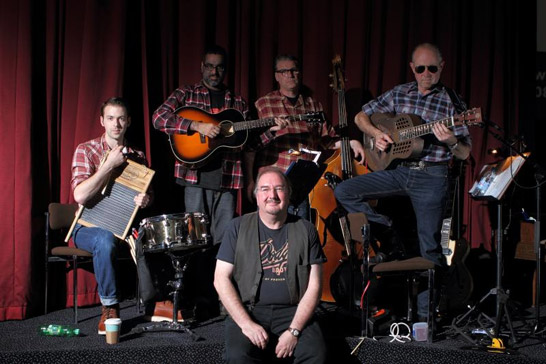The Dodge Brothers and Neil Brand are making it three-in-a-row at this year’s Bradford International Film Festival, having performed for our collective delight in 2012 and 2013. This year they’re presenting a world premiere.
Silent film pianist extraordinaire Neil Brand shares some of the secrets of their trade.
How do you select the films you accompany with the Dodge Brothers?
NB: I travel to film festivals around the world and tend to see the new restorations that have been done in the last few years. I’m always on the lookout for material that suits the Dodge’s style—Americana obviously, but also gritty, realistic dramas that have real heart to them, as well as trains and/or prisons. Both Beggars of Life (performed at BIFF in 2012) and The Ghost that Never Returns (BIFF 2013) were films I came across at festivals.
Unfortunately the ideal Dodge Brothers movie plot wish-list (Deep South, sexual tension, elements of horror) doesn’t quite exist in the canon of available silent movies, or if it does, wouldn’t work with a modern audience.
Can you tell us a little about this year’s film, Hell’s Hinges; what elements appealed to you and what did you want to contribute through the score?
NB: For me, Hell’s Hinges is the High Plains Drifter of its day. William S Hart was the first true cowboy star, yet his character was always that of a flawed loner faced with a moral decision—he shoots people but he also cries on-screen, and his stories have a real touch of authenticity to them.
Hell’s Hinges is the name of a corrupt town where the new preacher and his sister (who Hart’s character falls in love with) try to establish a new order but are sucked into the town’s moral depravity. There’s a very strong ending involving a terrible retribution.
The score will have elements of revivalist gospel songs of the period but also ballads and songs that give us the character of Hart and the choices he faces.

How long does it take to get from the film selection to performance? Can you give a little insight into the process?
NB: To be frank, Mike Hammond (The Dodge Brothers’ guitarist and lead vocalist) scores the film up and the band and I play through his suggestions. Then, when we come to play the film there will be certain points where I drop out of the mix and others where they will drop out, but every performance is a bit different from the last. We don’t spend a whole lot of time rehearsing the score as so much is about what happens in the moment, in front of an audience.
There is a large element of improvisation throughout—we all agree on start points for numbers, keys and a rough idea of duration; beyond that we feel the mood of the movie as we go and try things out. If one member of the band gets an idea and runs with it we’ll all try and follow. It’s all about matching the momentum of the film, really, and what we’re doing will feel seamless when the audience is deep in the drama.
So, in short, it’s not too long from film selection to performance, as long as the band likes the film!
Here at the museum we’re very excited about the fact your performance for Hell’s Hinges is a world premiere. Are there any nerves about how the first audience will react?
NB: Not really—it’s one of the great silent movies and the first truly great Western. I know we’ll bring a strength to it through the music which will help it, and the film itself works incredibly well even after all these years. That premiere performance is going to be a blast.
Your BBC series aired earlier this year (Sound of Cinema: The Music that Made the Movies, BBC 4). Are you noticing more interest and knowledge about music in films?
NB: Yes, it feels as if it touched a lot of people who sort of knew about film music but hadn’t considered the whole history. That’s really what I’m most proud of—the number of people who really enjoyed the nuts and bolts of analysing these scores we all know, and who now say it’s changed the way they listen to music in films.
Is it possible for you to watch films and not analyse the score?
NB: I’m pretty lucky in that I can switch off the analytical bit of me and just enjoy a movie. Having said that, a really horrible music cue will jar like mad and affect my response to the rest of the film, but generally, I lose myself in movies and take the music as part of the whole experience.
It’s your third year at BIFF and you also performed at the inaugural Ilkley Film Festival in February (with Paul Merton, but without the Dodge Brothers)—do you get much chance to explore Yorkshire?
NB: I love the Dales, always have done, and have explored all round there over the years—my son will soon be old enough to do some proper distance walking and I’m really looking forward to introducing him to the Dales one day.